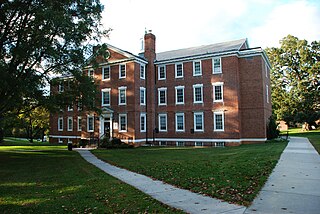The following are tertiary education institutions, or programs within parent institutions, that are specifically intended for non-traditional students in North America.
The following are tertiary education institutions, or programs within parent institutions, that are specifically intended for non-traditional students in North America.
The University Corporation for Atmospheric Research (UCAR) is a US nonprofit consortium of more than 100 colleges and universities providing research and training in the atmospheric and related sciences. UCAR manages the National Center for Atmospheric Research (NCAR) and provides additional services to strengthen and support research and education through its community programs. Its headquarters, in Boulder, Colorado, include NCAR's Mesa Laboratory, designed by I.M. Pei.

The University of Bridgeport is a nonprofit private university in Bridgeport, Connecticut. The university is accredited by the New England Commission of Higher Education. In 2021, the university was purchased by Goodwin University; it retained its own name, brand, and board of trustees.

Southern Connecticut State University is a public university in New Haven, Connecticut. Part of the Connecticut State University System, it was founded in 1893 and is governed by the Connecticut Board of Regents for Higher Education.

The University of the District of Columbia (UDC) is a public historically black land-grant university in Washington, D.C. It was established in 1851 and is the only public university in the city. UDC is a member school of the Thurgood Marshall College Fund. The full university system offers workforce and certificate programs in addition to Associate, Baccalaureate, Master's, professional, and Doctoral degrees. The university's academic schools and programs include the UDC Community College, College of Arts and Sciences, School of Engineering and Applied Sciences, School of Business and Public Administration, Colleges of Agriculture, Urban Sustainability & Environmental Sciences, and David A. Clarke School of Law.
An academic honor code or honor system in the United States is a set of rules or ethical principles governing an academic community based on ideals that define what constitutes honorable behaviour within that community. The use of an honor code depends on the notion that people can be trusted to act honorably. Those who are in violation of the honor code can be subject to various sanctions, including expulsion from the institution. or in other words, honor code is like a pledge taken by students to the effect that they will uphold academic integrity and ethical behavior and will not engage in any kind of cheating, stealing, and misrepresentation. One of the first such codes was created at the College of William & Mary in the early 18th Century.
Trinity Washington University is a private Catholic university in Washington, D.C. The university was founded as Trinity College by the Sisters of Notre Dame de Namur in 1897 as the nation's first Catholic liberal arts college for women. Trinity was chartered by an Act of Congress on August 20, 1897. It became Trinity Washington University in 2004.

Western New England University is a private university in Springfield, Massachusetts. Academic programs are provided through its College of Arts and Sciences, College of Business, College of Engineering, School of Law, and College of Pharmacy and Health Sciences.
The Northeastern University School of Law (NUSL) is the law school of Northeastern University in Boston, Massachusetts. Founded as an evening program to meet the needs of its local community, NUSL is nationally recognized for its cooperative legal education and public interest law programs.

Southern New Hampshire University (SNHU) is a private university between Manchester and Hooksett, New Hampshire. The university is accredited by the New England Commission of Higher Education, along with national accreditation for some hospitality, health, education and business degrees. SNHU is one of the fastest-growing universities nationwide with 135,000 online students and 3,000 on campus.
The following is a timeline of women's colleges in the United States. These are institutions of higher education in the United States whose student population comprises exclusively, or almost exclusively, women. They are often liberal arts colleges. There are approximately 35 active women's colleges in the U.S. as of 2021.

Men's colleges in the United States are primarily those categorized as being undergraduate, bachelor's degree-granting single-sex institutions that admit only men. In the United States, male-only undergraduate higher education was the norm until the 1960s. The few remaining well-known men's colleges are traditional independent liberal arts colleges, though at present the majority are institutions of learning for those preparing for religious vocations.
The Council of Public Liberal Arts Colleges (COPLAC) is a consortium of 30 public colleges and universities in 27 states and one Canadian province. Established in 1987, COPLAC advances the aims of its member institutions and drives awareness of the value of public liberal arts education in a student-centered, residential environment.
The Association of Public and Land-grant Universities (APLU) is a research, policy, and advocacy organization of public research universities, land-grant institutions, state university systems, and higher education organizations. It has member campuses in all of the United States as well as the District of Columbia, four U.S. territories, Canada, and Mexico.